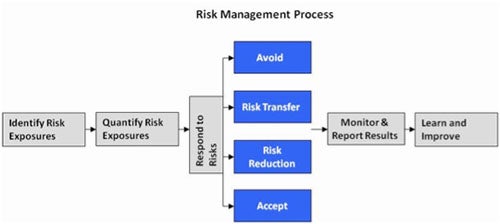Risk Management Overview
Risk management is the process of analyzing exposure to risk and determining how to best handle such exposure. Georgetown’s risk management process undertakes a best practices approach and focuses on understanding the key risks and managing them within acceptable levels. It is a collaborative process where risk response plans are developed in concert with the stakeholders who understand the risks and are best able to manage them.
The following steps outline the University’s approach to risk management:
- Identify the most significant risks arising from operations on an on-going basis.
- Prioritize risks based on the likelihood of occurrence and potential impact.
- Implement strategies to mitigate risks
- Monitor effectiveness of risk management efforts.

When responding to risks, the University can use different strategies for managing the risk including:
- Avoidance – Avoiding the risk by discontinuing the activity that generates it
- Acceptance – Retaining the risk (self-insurance)
- Mitigation – Reducing the likelihood and impact of a risk (loss control programs)
- Transfer – Shifting ownership of risk to a third party (insurance)
